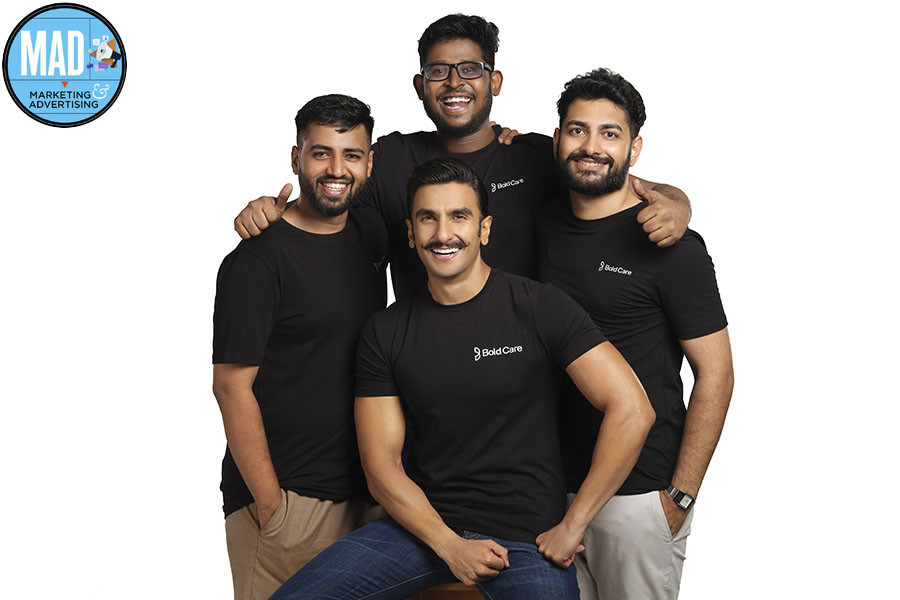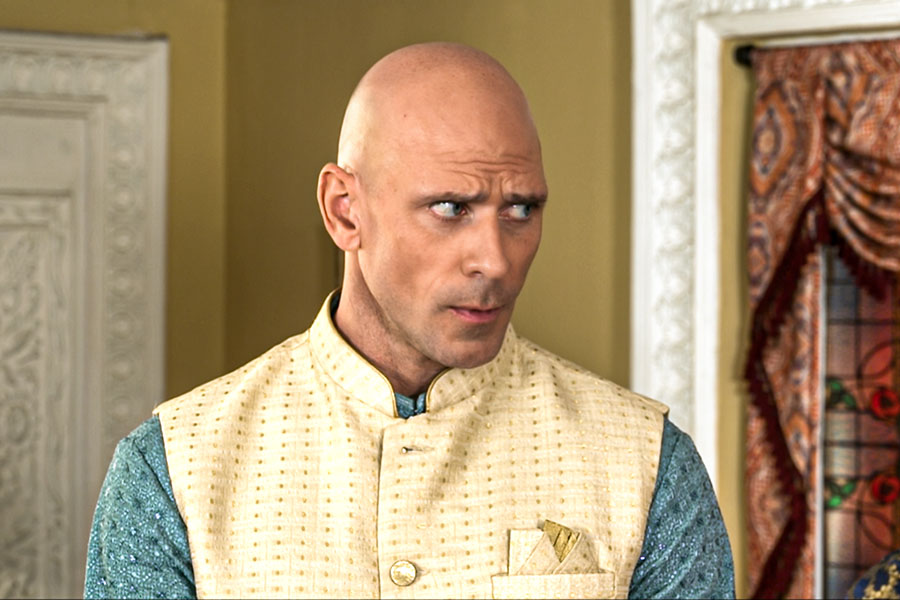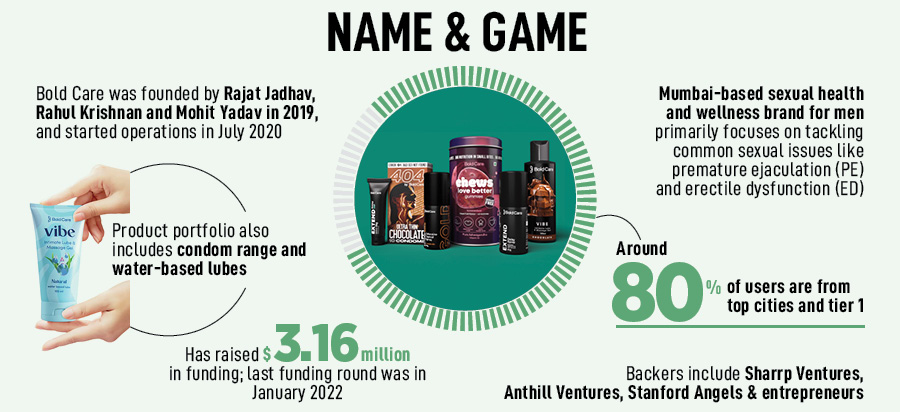
Porn star, superstar and a bold act
A college dropout is trying to bring the spotlight back on stigmatised subjects that men don't want to talk about: Erectile dysfunction and premature ejaculation. And the ones doing the talk for Bold Care are Ranveer Singh and American adult actor Johnny Sins
 Left to Right -- Rajat Jadhav, Co Founder & CEO; Ranveer Singh, Co Founder, (Center); Rahul Krishnan, Co Founder; Mohit Yadav, Co Founder of Bold Care
Left to Right -- Rajat Jadhav, Co Founder & CEO; Ranveer Singh, Co Founder, (Center); Rahul Krishnan, Co Founder; Mohit Yadav, Co Founder of Bold Care
A college dropout-turned venture capitalist (VC), Jadhav failed in his first two startup ventures as a founder. “I am trying to shatter taboos and make people talk,” says Jadhav, who ran a fledgling e-pharmacy business in college, and years later co-founded Bold Care with Rahul Krishnan and Mohit Yadav in 2019. Bold Care started operations in July 2020, got a clutch of angels and VC funds, including Rishabh Mariwala-founded Sharrp Ventures, and now has managed to get Ranveer Singh as a co-founder. Though in the game for close to four years, the sexual wellness brand largely remained inconspicuous. “So it took a porn star and a superstar to finally become visible?” I ask, requesting him to share the backstory of roping in Sins and Singh.
 Porn actor Johnny Sins in the Bold Care ad.
Porn actor Johnny Sins in the Bold Care ad.Jadhav, though, first tells us about the trigger behind starting Bold Care. The roots lie in his second venture, an e-pharmacy started in 2015. Though the platform was rudimentary in nature and it was early days for e-pharmacies, around 60-65 percent of volumes were driven by sexual health-related orders. “That was the aha moment,” he says, adding that his venture couldn’t succeed because it lacked funds and focus, and the founder dropped out of college and joined the VC world.
During his second stint as a VC, he bumped into one of the legacy health care companies and was stumped by the data shared by them. Around 20 percent of the volume on their platform was around sexual health, and they funneled those to other companies who dealt with sexologists. “This gave me immense hope that there is a big market,” says Jadhav, who saw the taboo around the topic as an opportunity. “The best way to engage with a censored or a tabooed topic is humour. It makes you feel comfortable and opens you up,” says the founder, alluding to the cheesy advertisement with Sins and Singh, who has been involved in the business for a year.
But what made him have Sins in the commercial? “The idea came at 2 at night,” laughs Jadhav, who along with his co-founders had been brainstorming about a way to grab attention. The curse of this problem, underlines Jadhav, is that it has been ignored for ages. “There is an elephant in the room and nobody wants to talk about it,” he says. Meanwhile, during one of the late-night sessions, Sins’s name popped up. The idea was to convey the message that even an adult star like Sins might have a problem. “The first step in tackling the issue is talking about it. It’s about addressing it, facing it,” he says. “Let’s talk about it.”

Let’s talk about sex
Well, to be fair, this is not the first time that brands, globally as well in India, have been trying to nudge users—men and women—to break taboos around sex and sexuality. In 2017, condom brand Durex stunned everybody with its Valentine’s Day advertisement which read: “We are faking it”. In India in 2019, Durex rolled out a campaign that tried to highlight the issue of ‘orgasm inequality’ by claiming that around 70 percent women in India don’t orgasm every time during sex.Bollywood, too, has been making movies that tackle various aspects around topics that are either shunned or are brushed under the carpet. If Shubh Mangal Saavdhan (2017) was about erectile dysfunction, then Janhit Mein Jaari (2022) was about condoms. If Vicky Donor (2012) was woven around sperm donation and infertility, and masturbation was one of the talking points of OMG 2 (2023), then Pad Man (2018) was about menstrual hygiene. In fact, if one goes back to 1996, Deepa Mehta’s Fire brilliantly explored the topic of lesbianism. Clearly, Bold Care is not the boldest in town to broach the tabooed subject, but is definitely the first one to grab massive eyeballs in the way it has handled the issue. Also read: Tearing through India's sex paradox: Rising infertility, less condoms, more babies
Advertising and marketing experts find the collaboration between Singh and Sins interesting. “The advertisement is cinematic; the story line is as trite as it comes, but Ranveer’s presence adds value,” reckons Harish Bijoor, who runs an eponymous brand consulting firm. “To an extent, the visuals are not about things happening in bed but things happening in mid-air,” he laughs, adding that the digital campaign scores full marks in creating instant awareness. It also scores high on being innovative and does not include cliched visuals of bedrooms or nudity. “Marketing is about giving a solution to a problem, and the brand is offering a solution to a problem that seemingly a large population faces,” he says. “Awareness is the need of the hour.”
The VCs too wanted to join the ‘noble cause’ by empowering men. “Investing in Bold Care wasn't just about financials. It was about breaking barriers and empowering men,” says Rishabh Mariwala, founding and managing partner, Sharrp Ventures. Bold Care, he underlines, has built a brand that tackles a stigma head-on, offering solutions in an open and accessible way. “The market potential for men's sexual wellness is massive,” reckons Mariwala, adding that Bold Care's innovative approach, combined with a strong leadership team, will pay dividends. “I'm excited to be part of their journey towards normalising conversations and improving men's lives.”
Well, two decades back, there were conversations around Pappu, but of a different kind. Also read: The sexual wellness boom and how brands are addressing a new consumer
It’s Pappu, again
Let’s rewind and meet the original Pappu.It was 2005, the brand was Cadbury Dairy Milk, the brand ambassador was Amitabh Bachchan and the campaign was ‘Kuch meetha ho jaaye’. Back then, Pappu was an endearing character, a school student who finally cleared his senior secondary exams (Class 12), and this called for sweet and innocuous celebrations. ‘Pappu paas ho gaya’ became viral in an era when there was no digital advertising, Instagram, Facebook and X (formerly Twitter). The commercial was sweet, warm and was liked by all kinds of demographics. In fact, just like ‘Wah Sunil babu, naya ghar, nayi gaadi… badhiya hai’ (Asian Paints’ ad campaign in 2004), Pappu became a part of popular culture and daily life.
Over the next few years, Pappu got a new meaning, and look. It started getting associated with losers and morons. “Pappu hai kya [are you Pappu]?” was the new jibe. Nobody wanted to be called a ‘Pappu’. Then came 2008, the year ‘Pappu’ was again made the laughing stock in the song ‘Pappu can’t dance’. Gradually, anybody who couldn’t dance became a Pappu! Three years later, came a movie that tried to grab eyeballs by riding on the popularity of ‘Pappu can’t dance’. The movie bombed, but the name had instant recall.
Fast forward to 2024. Pappu undergoes further degeneration and becomes men’s sexual organ! So now if a man is suffering from erectile dysfunction and premature ejaculation, the crude slang to make fun of him would be ‘Pappu can’t dance’.
Not all, though, are excited about the new version of Pappu. Abhijit Avasthi, the advertising genius behind the ‘Pappu paas ho gaya’ campaign for Cadbury, is furious. And rightly so. “Unfortunately, there is a march of mediocrity fueled by unimaginative marketers who rely only on celebs and media monies,” says the renowned adman, who has worked on memorable campaigns for iconic brands such as Fevicol, Asian Paints, Tata Sky and Bajaj Pulsar. In 2015, Avasthi started his entrepreneurial innings when he quit Ogilvy and co-founded Sideways. “Spineless agencies don’t stand up to doing the right thing either. All in all, tragic,” he rues the state of affairs.
Avasthi’s contention resonates with marketing experts. Parodies are always humorous, but they are rarely full of sexual innuendoes. “This one is. That’s why it leaves a bad taste in spite of the humour quotient,” reckons Ashita Aggarwal, professor (marketing), SP Jain Institute of Management and Research. Such campaigns, she underlines, will grab eyeballs, as it plays to the gallery. “But will it help men walk the talk?” she asks. At times, there are campaigns that take the focus away from the subject. Remember a series of disruptive commercials by Cred, including the coup of roping in Rahul Dravid as an angry young man? People enjoy the advertisement but forget the messaging or the brand.
Coming back to the brand-new Pappu, given the new meaning, will it make sense for Cadbury to revisit ‘Pappu paas ho gaya’ or would it be befitting to let the new ‘Pappu’ stay so that a man can exult in jubilation and scream ‘Pappu pass ho gaya’ after fixing his dysfunctionality?
Post Your Comment


















